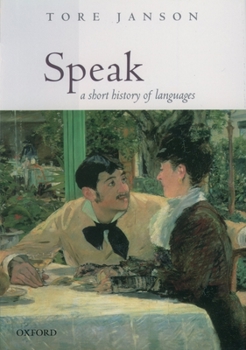Speak: A Short History of Languages
Select Format
Select Condition 
Book Overview
How does a language come into being and when does it disappear? What actually happened to Latin? When was English created? Will all people on Earth speak English or Chinese in 200 years? These are a few of the fascinating questions discussed in A Short History of Languages. It is about how historical conditions shape languages and how languages influence the course of history. The book starts with a discussion of the period of hunters and gatherers, when there was a huge number of languages. It moves on to Greek and Latin, to French and Italian, and naturally a full discussion of English. Many other languages are treated, from Setswana in southern Africa to the Creole language of Nevis in the West Indies. Hanson presents languages and cultures in a lively way, with concrete examples and, often, small samples from literary works. Although no knowledge of foreign languages is required, the book provides astonishing insights into many cultures and their languages. At the same time, it identifies long terms trends in history that may allow us to make predictions about the future.
Format:Hardcover
Language:English
ISBN:0198299788
ISBN13:9780198299783
Release Date:April 2002
Publisher:Oxford University Press, USA
Length:310 Pages
Weight:0.75 lbs.
Dimensions:1.0" x 6.9" x 5.0"
Customer Reviews
2 ratings
An important subject of human evolution and history
Published by Thriftbooks.com User , 17 years ago
Fantastic!. I have had the opportunity to deal with people from different nationalities, from India, China/Taiwan, Great Britain/USA, France and Brasil and by obvious reasons you learn a little bit about those languages, noticing the marked pronunciations and accents, that makes you wonder about the nature of any specific language. This entertaining book provide insights about how language is created, evolve into others forms and sometimes how they cease to exist. There are reference to mostly all languages and it was fascinating to know little aspects of Africa's languages, the evolution of latin into the romance languages and the story of English. Spanish is my first language and when comparing it with portuguese there is no much difference in the writing -- portuguese is like castilian but badly written (with all due respect) -- the major difference is in the phonetic, so everytime I need to speak to someone portuguese, we ended up speaking english to better understand each other. English is my second language and I think this language have some advantages compared to other languages, for example, most of the books written by the best scholars and scientists come in English so in my case it was important to know this language in order to read this great book and other books that are only published in English.
Good overview of the history of some languages
Published by Thriftbooks.com User , 19 years ago
Tore Janson's "Speak" is a succinct, readable overview of the history of languages, focusing primarily on English and Western languages. This is a well-written, informative book. Janson starts by giving a brief overview of the development of languages, including mentioning one of his major themes of the book - a language is only a language if its speakers recognize it as such. He then traces the history of the Mesopotamian languages, Greek, Latin, and then the modern European languages, finally devoting a chapter to English's current dominance in the world. Finally, Janson concludes with a short chapter on the possible future development of languages. John McWhorter's "Power of Babel" is the only comparable book that I have read. McWhorter is a little more entertaining and explains the actual dynamics of language change better, but Janson's story is more structured, linear and complete. This book is a good overview of the history of language for a layman.






